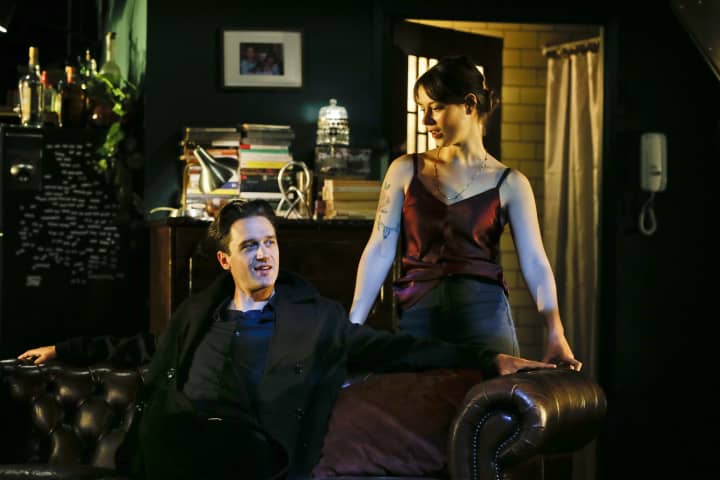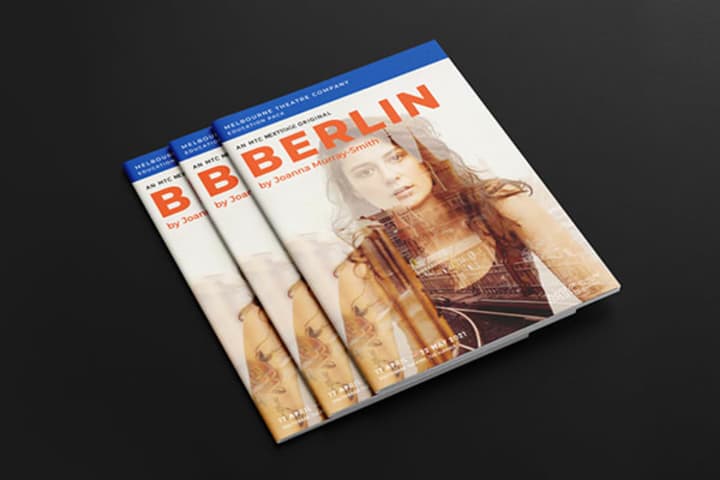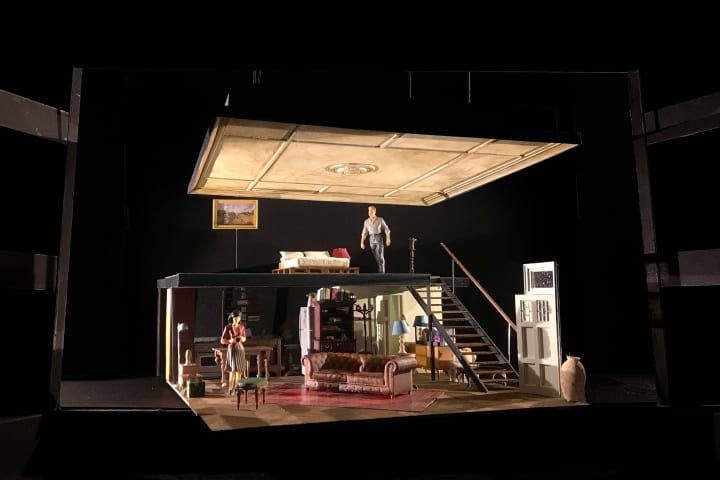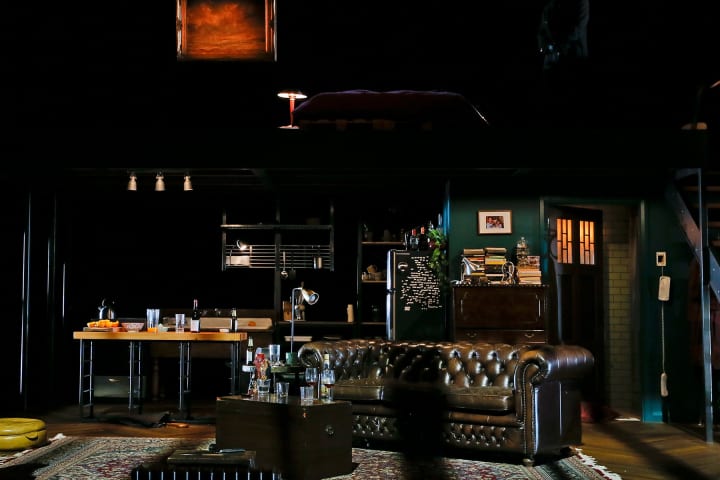‘Things got existential for a while there last year.’ Director Iain Sinclair muses on defibrillating plays, Hamlet’s first ever performance and how a ‘toothy’ mystery that invites complex responses is just what we need right now.
It’s week two of take two of rehearsals on the show, which you began rehearsing almost exactly 365 days ago. How does it feel?
It’s such a strange thing – I’ve never defibrillated a play before! It feels a bit like you met somebody on a holiday and there was a bit of magic between you but then nothing happened. And then you see each other again a year later and you’re trying to work out if the magic is still there!
How has the forced hiatus affected your approach to the play, if at all?
It’s a funny game in a way, because directors book gigs a year or more in advance a lot of the time. So it’s always an interesting game you have to play with yourself about how well you get to know a play before you go into the room. I discovered in my 30s that it’s not always the best thing to obsess over a play for too long before the actors get onto it. The discovery process needs to be a mutual one because it’s a communal art form after all.
This play is a mystery in lots of ways, with all this terrifically toothy and challenging intellectual and ethical material, and I didn’t want to start coming up with too many answers. I wanted to keep that sense of a beginner’s mind, that sense of freshness in my approach.
Speaking of fresh, Berlin is a brand new play. Does working on a new play, as opposed to an established classic, change the way that you direct at all?
Yeah it does actually. One of the best bits of advice I was ever given was from [former Royal Court Theatre Artistic Director] Max Stafford-Clark, who I AD’d for back in the day. He said that the best thing to do with new works is to treat them as though they’re classics, to give them the respect they deserve; and the best thing to do with classics is to treat them as if they’re new works. I mean, it’s a funny thought but Hamlet had the first night one time! And something like A View from the Bridge, which seems to be such a perfectly built play, Arthur Miller couldn’t sell it!
‘This work has so much about the past floating around in it; it rises up around you like a tide. And so on that level, as well, it’s terrifically interesting as it’s sort of a contemporary way of time traveling.’
I’ve been very fortunate in my career and most of the time I’ve actually managed to flip between one and the other. Even just with MTC, it’s worked that way so far. First it was The Beast, and then A View from the Bridge, and now Berlin. So I’ve sandwiched a classic between two new works, and I find that’s a really wonderful way to go about it. There’s something wonderful about being at the coalface, on the Promethean side of theatre-making, as well as being able to dive into the classic side of it. They both speak to each other so well because theatre, as they say, is the art of the present moment. And I really love that feeling of bringing present-ness to a work.
And this work has so much about the past floating around in it; it rises up around you like a tide. And so on that level, as well, it’s terrifically interesting as it’s sort of a contemporary way of time traveling. Doing new plays and old plays is, in a way, like diving into alternate universes and seeing what we can learn from each.
And having access to the writer, to their brain?
Oh it’s heaven! Especially having a writer with the experience and the skill level of Joanna Murray-Smith. I was senior dramaturg at Playwriting Australia for four years, so I’m very experienced in working with playwrights of many different levels of experience, but it’s really something when you get to work with a playwright that you’ve admired for a long time. I feel like I’ve had the most robust conversations I’ve had in a very long time because Joanna’s such a confident and skilled playwright.
But in general, I’ve discovered across my career that it’s highly likely the playwright is smarter than most people in the room, and if you give them that credit most of the time it really follows through, it really delivers. I don’t know how they do it! I am in complete awe of them.
Can you cast your mind back to when you first read the script: what were your initial thoughts?
My first impression when I read Berlin was that this is classic Joanna Murray-Smith. It has all of the ingredients that she’s so very good at: she’s terrifically skilled at creating a sense of mystery, and she’s terrifically skilled at challenging her audiences to go places where they might have been a little bit ethically, morally or intellectually lazy. You can’t ignore the challenges that she throws into a room, and you have to have the courage to step into that space.

Grace Cummings and Michael Wahr rehearsing Berlin. Photo: Charlie Kinross
The other thing I thought when I first read it was that we were going to need two actors with real chemistry, who’ve got real smarts, and who were willing to step into the arena, so to speak, and really duke it out. It’s no small job for two young actors to hold a mainstage production with terrifically toothy material for an hour and 40 minutes.
I knew I had my work cut out for me but I also knew that the structure would hold, and that if I do my job properly, Jo’s extraordinary stagecraft will be there to catch us.
You touched on the fact that it’s dealing with these big ethical, important issues. With similar issues taking on increasing resonance in the Australian conversation now, what are you hoping audiences will take away from the play?
Speaking as a dramatic artist, what interests me the most is inviting complex responses. I think we’re living in a time, partially metastasized by everyone being indoors and spending too long on their computers, in which very simple, low resolution, ideologically based solutions have been thrown out there, left and right; and they’re not very smart ideas, they’re emotionally strident and intellectually lazy. I think what is so exciting and interesting about this play is that you cannot have a low-resolution response to it. It forces you to not just embrace the intellectual and ethical and moral complexity of it all, but also the emotional complexity of it.
‘It’s never the easy solution, it’s never the quick answer; we all need to have the humility and the courage to step in the same room and disagree with each other until we can find some place where we can meet.’
And to get back to the idea of treating new works like classics it’s what dramatic art has always done so well – it’s what the Greeks knew and it’s what the Elizabethans knew, which is that this art form is not about making political standpoints; this art form is better than that, this art form is about dissolving the easy solutions and forcing ourselves back into the arena to sit in public again and deal with these knots, these Gordian knots, that we have not yet untied.
We still haven’t solved the mysteries that Sophocles was writing about. But that doesn’t mean we shouldn’t try! And I think the same goes for this play too: it has a feeling that’s not dissimilar to A View from the Bridge in that it’s dealing with elemental human impulses that have to be apprehended and wrestled with, but which also are possibly not solvable. Certainly not solvable over a night in a theatre, but we still have to take the skin off it to look deeper in, we still have to be grown up about it as a culture. And I think that’s the big thing that makes Berlin connect with Australia’s contemporary situation: it’s never the easy solution, it’s never the quick answer; we all need to have the humility and the courage to step in the same room and disagree with each other until we can find some place where we can meet.
Berlin is on at Southbank Theatre from 17 April. Tickets on sale now.
Published on 15 April 2021





